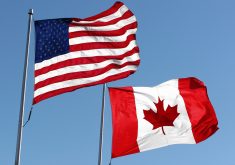Journalists, lobbyists and anyone in Washington, D.C., with an interest in trade likely has an opinion about the following question: if negotiations stall, will U.S. President Donald Trump walk away from the North American Free Trade Agreement?
Some trade analysts have said Trump’s threats are a strategic bluff to get a better deal for the United States or political rhetoric to appease his anti-trade base of voters.
Others in Washington think Trump could pull the plug on NAFTA.
“A lot of people are just as nervous as hell. There is the constant threat … that the Trump administration could just say, ‘forget this, we’re walking out,’ ” said Bill Tomson, senior trade editor with Agri-Pulse, an agriculture and food media outlet in Washington.
Read Also

Farming Smarter receives financial boost from Alberta government for potato research
Farming Smarter near Lethbridge got a boost to its research equipment, thanks to the Alberta government’s increase in funding for research associations.
One of the nervous people is Sonny Perdue.
“I know the Secretary of Agriculture has gone over to the White House at least twice now to try and calm down the situation and get the negotiations back on track,” Tomson said. “It’s high stakes.”
Tomson isn’t sure if Trump and his negotiators would abandon the NAFTA renegotiation in the short term, but it’s a real possibility if the negotiations get stuck in December or January.
“Commerce Secretary Wilbur Ross, U.S. Trade Representative Robert Lighthizer, they both said that if there’s some type of deadlock … that they’re willing to just walk away,” he said.
“They’re not going to let this drag out.”
Representatives of Canada, Mexico and the U.S. are holding the fourth round of negotiations in Washington this week to update the 24-year-old trade deal.
The three countries formally began talking about NAFTA in August because Trump promised to rip up or renegotiate the deal during his 2016 campaign, calling it the worst trade agreement in U.S. history.
So far negotiators have avoided the difficult topics, such as America’s frustration with Canada’s supply managed dairy sector.
Patrick Leblond, senior fellow with the Centre for International Governance Innovation’s Global Economy Program and an associate professor of public and international affairs at the University of Ottawa, said negotiators will get to the controversial issues, but Canada should be patient.
“My view is that, certainly, the negotiations are going to go on into 2018,” said Leblond.
He said Canada shouldn’t agree to a deal in haste because Trump is unpredictable.
Instead, Canadians should understand that walking away from NAFTA is trickier than Trump assumes.
Pro-trade groups and politicians in the U.S. would push back hard against a withdrawal.
“Probably Congress would challenge the president’s unilateral ability to walk out of international agreements,” Leblond said.
“(And) I wouldn’t be surprised if some business association or an agricultural association actually challenged the executive order in the courts…. Given the political reality that Trump would face, we can afford to … basically call the bluff.”
If recent history is any indicator, the U.S. agricultural sector would definitely respond to a NAFTA withdrawal.
When Trump threatened to rip up the U.S.-South Korea free trade deal in September, groups that represent pork, soybeans and other export commodities made their voices heard.
“You saw just a massive uprising,” Tomson said. “Every single farm group that has an office in anywhere near Washington reacted.”
Trump’s threat against South Korea did have an effect because the two countries agreed in early October to begin talks to amend the deal.
U.S. farm groups mostly support the existing NAFTA deal, with the exception of the dairy sector.
Tomson said U.S. negotiators will likely push hard for more access to Canada’s dairy market because they need to back up the president’s words.
“I would think that this would have to be addressed, or will be addressed, is because President Trump called out Canada on this issue,” he said. “It’s kind of hard to back down on that.”

















